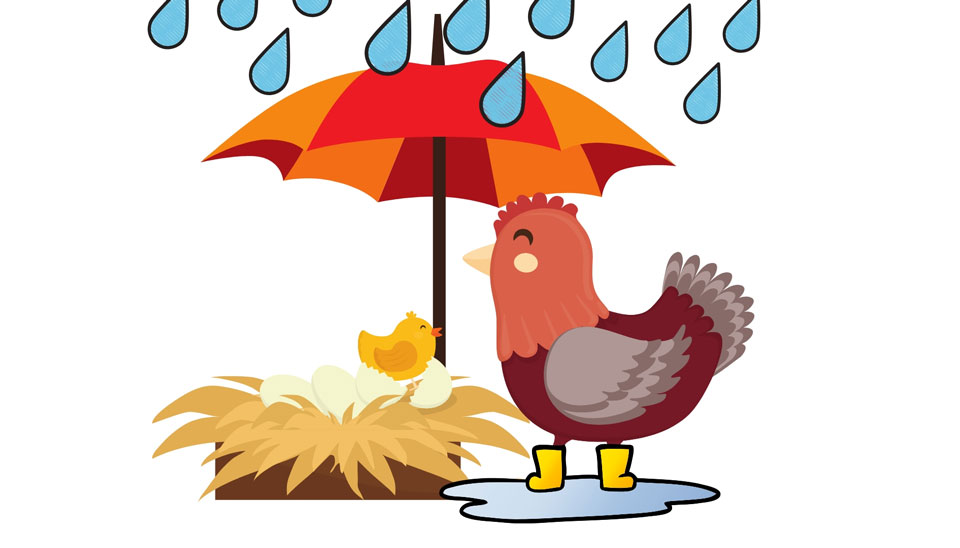How to Keep Chickens Healthy in Wet Weather
How to Keep Chickens Healthy in Wet Weather
New Zealand weather can be wet and unpredictable, and backyard chicken keepers often notice that their flock's health takes a hit during rainy spells. Common issues like coccidiosis, respiratory illnesses, and botulism tend to increase after heavy rainfall. However, with some careful planning and coop management, you can help prevent your chickens from getting sick during wet weather. Here’s how you can keep your chooks healthy and happy when it rains.
Also, read our related article of the Top 6 Ways to Prevent Disease in the Chicken Coop
How to Keep Chickens Healthy in Wet Weather
While you can’t control the weather, there are several ways to protect your chickens and prevent illness during rainy spells.
Here are six practical tips to keep your flock healthy when it's wet outside:
- Let your birds out after the rain: Once the downpour has stopped, let your chickens out of the coop to stretch their legs and avoid overcrowding. This is a great time to clean out the coop while they’re outside.
- Ensure proper ventilation: A well-ventilated coop is crucial, especially in wet weather. Good airflow helps reduce moisture buildup, preventing the growth of mould and bacteria. However, make sure the coop is protected from cold winds and rain, as drafts can make your chickens sick.
- Keep the coop clean and dry: Regularly spot clean the coop and add fresh, dry bedding. Wet or soiled bedding creates an ideal environment for harmful organisms and can lead to issues like Bumblefoot. Change out any wet bedding immediately to keep your chickens healthy.
- Provide a dry dust bath: If you have space in the run or coop, give your chickens access to a dry dust bath. This will help them maintain good feather condition and keep external parasites like mites and lice under control.
- Clean the coop thoroughly: After the rain stops, clean the coop as soon as possible. Even if the rain is ongoing, you might need to grab a raincoat and clean it out during the storm to prevent bacteria and mould from getting out of hand.
- Watch for signs of illness: Keep an eye on your flock for early signs of sickness, like lethargy, diarrhea, or laboured breathing. Wet weather itself doesn’t cause illness, but it can create conditions that allow diseases to thrive. If you spot any sick birds, isolate them immediately, clean the coop, and start treatment.
Should Chickens Go Out in the Rain?
Chickens can handle a little rain thanks to their somewhat waterproof feathers, but when the weather turns cold and wet, they can become chilled easily.
If the temperature drops below 15 degrees, it's best to keep them inside where it's warm and dry. That said, most chickens will seek shelter if it’s raining too much for them. Letting them out when the rain is mild helps prevent overcrowding in the coop, which can lead to damp conditions and sickness.
Some hens, like Silkies, have feathers that aren’t waterproof at all, so it’s best to keep younger or sick birds, as well as breeds with delicate feathers, indoors when it’s wet. While most chickens can tolerate some rain, it’s the cold winds and extended wetness that can lead to health issues like respiratory infections.
Why Do Chickens Get Sick After Wet Weather?
Wet weather creates the perfect conditions for bacteria, fungi, and parasites to thrive. Muddy and soggy environments can quickly become breeding grounds for illness-causing organisms, especially when temperatures are warm. Here are the main reasons chickens often get sick after rain:
- Mould and Fungi: Wet environments help moulds and fungi grow, contaminating feed and irritating your chickens’ respiratory systems.
- Parasites: Damp, muddy conditions are a haven for parasites, including lice, mites, and intestinal worms. Chickens can pick these up as they spend more time in close quarters or drink from puddles.
- Lack of Dust Baths: Chickens rely on dust baths to help control external parasites, but when the ground is wet, they can’t dust bathe effectively. This allows lice and mites to multiply rapidly.
In short, rain and muddy conditions lead to a range of health problems if not properly managed. To prevent these issues, it’s important to keep the coop as dry and clean as possible.

Why Does the Coop Smell Bad After Rain?
A bad-smelling chicken coop after rain is often a sign of mould and bacteria growth, which thrive in damp environments. The smell can come from several sources:
- Wet Bedding: Soggy or wet bedding is a breeding ground for mould, bacteria, and fungi, which can cause respiratory issues in chickens.
- Fermenting Droppings: When bedding is wet, chicken droppings start to decompose faster, creating an unpleasant smell and releasing harmful gases.
- Poor Ventilation: Without proper airflow, damp conditions can cause moisture to linger, making it harder for the coop to dry out. This encourages the growth of mould and fungi, which can further irritate your hens’ respiratory systems.
To keep the coop smelling fresh and healthy, remove wet bedding regularly and replace it with dry, clean material. Ensure the coop has adequate ventilation to help moisture evaporate and keep your chickens’ living space dry.
Are Puddles in the Run Bad for Chickens?
Puddles might seem harmless, but they can be dangerous for chickens. Here’s why you should avoid letting puddles form in your chicken run:
- Contaminated Water: Chickens love drinking from puddles, but this water can carry harmful bacteria, worm eggs, and even coccidia, which cause coccidiosis. Puddles are also potential carriers of botulism, a serious bacterial illness.
- Wet Feet: When chickens walk through puddles, they bring moisture and mud back into the coop, which can soil bedding and increase the risk of illness.
- No Dust Baths: Wet conditions prevent chickens from taking dust baths, which are essential for controlling parasites like mites and lice.
To avoid puddles, make sure your chicken run is on higher, well-drained ground. Trim any overhanging trees that prevent sunlight from drying out the run, and fill in muddy areas with fresh soil to prevent water from collecting.
Final Thoughts
Wet weather can bring challenges, but with a bit of care and extra attention, you can keep your chickens healthy and avoid common wet-weather problems like coccidiosis, respiratory infections, and botulism. Regular coop maintenance, keeping things dry, and providing your chickens with a healthy environment will help keep your flock in top shape.
For solutions, check out our bird netting to keep wild birds and pests out of the coop, and our automatic chicken drinkers to keep fresh water available, even during rainy days. Our Dine-A-Chook chicken feeders are also great for reducing waste and keeping feed dry, which is important in wet conditions.
We're here to help you look after your flock, rain or shine!






